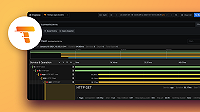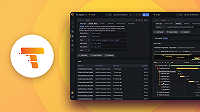This is documentation for the next version of Grafana Tempo documentation. For the latest stable release, go to the latest version.
Metrics summary API
Warning
The metrics summary API is deprecated as of Tempo 2.7. Features powered by the metrics summary API, like the Aggregate by table, are also deprecated in Grafana Cloud and Grafana 11.3 and later. It will be removed in a future release.
This document explains how to use the metrics summary API in Tempo.
This API returns RED metrics (span count, erroring span count, and latency information) for kind=server spans sent to Tempo in the last hour, grouped by a user-specified attribute.
Deprecation in favor of TraceQL metrics
The metrics summary API is now redundant given the release of TraceQL metrics. This API is therefore being deprecated to reduce our maintenance burden.
TraceQL metrics queries are significantly more powerful than what metrics summary API provides.
TraceQL metrics can look at arbitrary time windows (not just the last hour), return time series information (rather than just a single instant value over the past hour), and can look at all spans (not just kind=server).
To provide an example, if you were to aggregate by the attribute resource.cloud.region with the metrics summary API, you could get the same results with a couple TraceQL queries:
Rate of requests by resource.cloud.region
{ } | rate() by (resource.cloud.region)Error rate by resource.cloud.region
{ status=error } | rate() by (resource.cloud.region)The 50th, 90th, and 99th percentile latencies (for example, p99, p90, and p50) by resource.cloud.region:
{ } | quantile_over_time(duration, .99, .9, .5) by (resource.cloud.region)If you want something faster than typing these queries out in Explore’s code mode, use Grafana Traces Drilldown, a queryless experience for navigating your trace data stored in Tempo and powered by TraceQL metrics queries under the hood.
Activate metrics summary
To enable the deprecated) metrics summary API, you must turn on the local blocks processor in the metrics generator. Be aware that the generator uses considerably more resources, including disk space, if it’s enabled:
overrides:
defaults:
metrics_generator:
processors: [..., 'local-blocks']In Grafana and Grafana Cloud, the Metrics summary API is disabled by default. To enable it in Grafana Cloud, contact Grafana Support.
Request
To make a request to this API, use the following endpoint on the query-frontend:
GET http://<tempo>/api/metrics/summaryQuery Parameters
All query parameters must be URL-encoded to preserve non-URL-safe characters in the query such as &.
Example:
curl "$URL/api/metrics/summary" --data-urlencode 'q={resource.service.name="checkout-service"}' --data-urlencode 'groupBy=name'Response
The Tempo response is a SpanMetricsSummary object defined in tempo.proto, relevant section pasted below:
message SpanMetricsSummaryResponse {
repeated SpanMetricsSummary summaries = 1;
}
message SpanMetricsSummary {
uint64 spanCount = 1;
uint64 errorSpanCount = 2;
TraceQLStatic static = 3;
uint64 p99 = 4;
uint64 p95 = 5;
uint64 p90 = 6;
uint64 p50 = 7;
}
message TraceQLStatic {
int32 type = 1;
int64 n = 2;
double f = 3;
string s = 4;
bool b = 5;
uint64 d = 6;
int32 status = 7;
int32 kind = 8;
}The response is returned as JSON following standard protobuf->JSON mapping rules.
Note
The
uint64fields can’t be fully expressed by JSON numeric values so the fields are serialized as strings.
Example:
{
"summaries": [
{
"spanCount": "20",
"series" : [
{
"key": ".attr1",
"value": {
"type": 5,
"s": "foo"
},
},
...
],
"p99": "68719476736",
"p95": "1073741824",
"p90": "1017990479",
"p50": "664499239"
},

